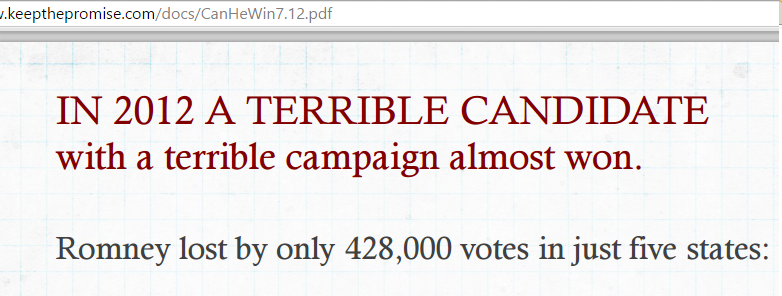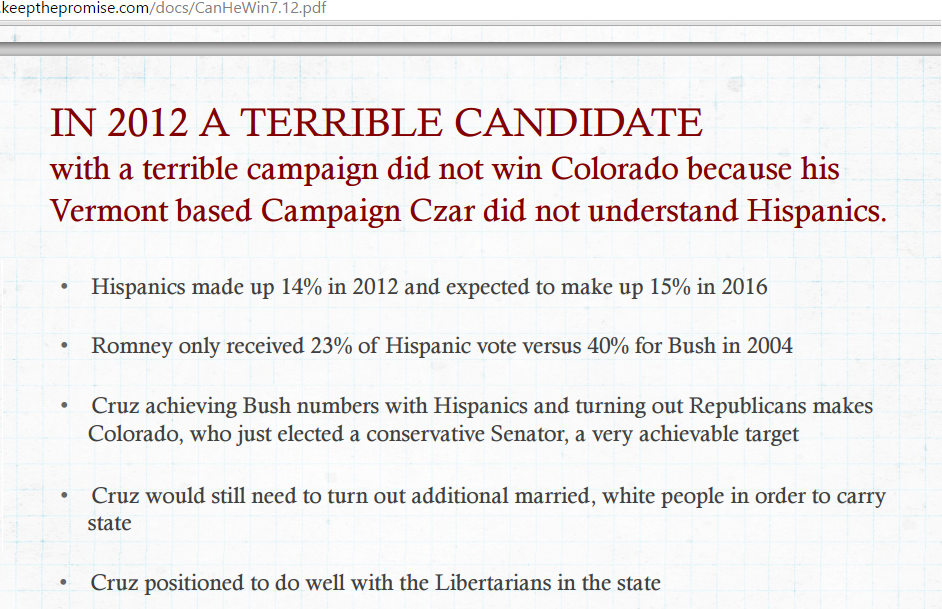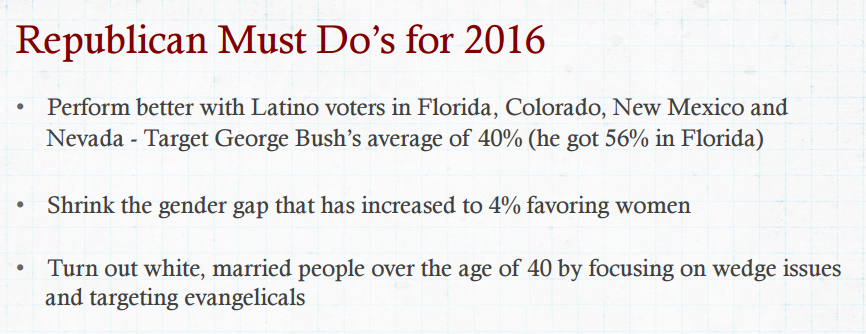The PAC backing Ted Cruz calls Mitt Romney a “terrible candidate” and believes Cruz will be able to turn his Cuban heritage into Hispanic votes if he wins the GOP presidential nomination. In a report titled, “Can He Win?” the PAC now headed by David Barton is sharply critical of Mitt Romney and his campaign for the presidency. CNN posted a link to a slide show with the same content back in July, but that link now is dead.

The report repeatedly tells readers, “In 2012 a terrible candidate with a terrible campaign almost won” and then refers to Romney’s performance among African-Americans and Hispanics. Here is the Colorado analysis:

Given Cruz’s Christian nation positions and the addition of very un-Libertarian Barton as head of the Keep the Promise PAC, my opinion is that this is wishful thinking.
A big part of the Keep the Promise strategy is to use wedge issues to get white voters to stay in the GOP fold.

What will bring out the white voters? According to Keep the Promise, Common Core, Immigration, Future not Past, National Security and Foreign Money. Honestly, I am not sure how Cruz is going to drive up white and Hispanic vote at the same time if his wedge issue is immigration.
Readers, do you think this PAC will bring home a Cruz victory?
Tag: david Barton
Ted Cruz Speaks At David Barton's Legislative Conference
The Keep the Promise Super PAC now being run by David Barton is not supposed to collaborate with Ted Cruz or his campaign. Thus, Cruz can’t be criticized directly for the fact that the PACs supporting him named Barton as the head of day to day operations. However, Cruz can be criticized for lending his credibility to Barton’s work when he speaks at Barton’s pastors briefing. Cue Alan Noble’s article on how to revitalize young conservatives.
@TedCruz speaking at #Wallbuilders Pastors Briefing in Washington, D.C. pic.twitter.com/RDafytdTnw
— David Barton (@DavidBartonWB) September 9, 2015
These events will now be scrutinized very carefully.
David Barton's New Project: What is Keep the Promise Super PAC?
Bloomberg broke the story today that David Barton has been appointed to lead the umbrella Super PAC Keep the Promise. The PAC supports Ted Cruz but is structured in a curious manner. There are actually several PACs which supported Cruz, four of which named Keep the Promise. It is not completely clear to me that Barton will lead all of them.
In any event, what is known about the KtP family of Super PACs?
Ballotpedia appears to be a good source of information about them. Some highlights of that entry (which you should read) are:
- Oil, gas and fracking interests figure prominently in the donor base. A combined $25 million went into the family of PACs from people who have interests in those sectors.
- One of the PACs gave $500k to a Super PAC which benefits Carly Fiorina.
- Only 10 people are reported as giving money to these PACs. A very small group of people are providing Cruz with immense support.
- One of the fracking donors is Farris Wilks who also pastors a church in Cisco, TX.
The FEC filing for the KtP PAC is here.
Want to donate? Here’s the pitch.
The Wilks brothers sound like they have attended a David Barton seminar. They are wasting their money preaching to the choir. People outside the bubble don’t buy it. They also run a church called Assembly of Yahweh which sounds like a 7th Day Adventist style church.
The amount of money to be spent in this election cycle is staggering and discouraging. So much will be spent and so little will be accomplished.
David Barton Will Assume Leadership of Ted Cruz's Super-PAC
 Bloomberg news is reporting that David Barton has become leader of a Super-PAC with ties to Ted Cruz.
Bloomberg news is reporting that David Barton has become leader of a Super-PAC with ties to Ted Cruz.
Keep the Promise PAC raised more money in the first half of the year than any other Super-PAC besides Jeb Bush’s, according to Bloomberg.
Well, to me, this mean Ted Cruz would rather be president of the Wallbuilders’ Fan Club than the U.S. It has sometimes been hard to get media to pay attention to Barton’s wild claims but this appointment may now make it easier.
John Adams on American Exceptionalism
In my opinion, whenever David Barton tells his audiences to read the founders writings, he takes a large risk that someone in the audience will actually do it. What such curious readers find is a hodgepodge of political theories with much disagreement on matters of substance. One will also find much that contradicts Barton’s tendentious claims. For instance, last week Barton said the founders all agreed that God’s law was higher than man’s law. Our second president John Adams is worth reading on these points.
Frequently, Barton promotes American exceptionalism. Next time he talks on that subject, he should try to explain John Adams words to John Taylor in an July 29, 1814 letter:
Again, how are the United States distinguished from all other governments, or from any other government? What are the good moral principles from which the governments of the United States are deduced, which are not common to many other governments? In all that great number and variety of constitutions which the last twenty-five years have produced in France, in Holland, in Geneva, in Spain, we find the most excellent moral principles, precepts, and maxims, and all of them complicated with the idea of a balance. We make ourselves popular, Mr. Taylor, by telling our fellow-citizens that we have made discoveries, conceived inventions, and made improvements. We may boast that we are the chosen people; we may even thank God that we are not like other men; but, after all, it will be but flattery, and the delusion, the self-deceit of the Pharisee.
In the entire letter, he gives no credit to the Bible or Christianity for American government. He does imply that man is sinful and bent for corruption which is consistent with a reformed view of human nature. However, in his defense of the Constitution, Adams claims that such knowledge of human nature may be discerned from reason without aid of revelation. In that work, Adams defends the checks and balances of the Constitution by addressing other views from history. In doing so, he criticizes those who attempt to generate good citizenship via religious exceptionalism.
If this writer had been one of the enthusiasts of that day, and told the people they must pray to God for his omnipotent grace to be poured out upon them, to distinguish them from all the rest of mankind as his favorite people, more even than the Jews were, that they might be enabled to observe the rules of a free state, though all history and experience, even that of the Hebrews themselves, and the constitution of human nature, proved it impossible without a miracle; or if he had told them that they were a chosen people, different from all other men, numbers would have believed him, and been disappointed; for it is impious presumption to suppose that Providence will thus distinguish any nation;
Adams criticizes what sounds very much like the battle cry of the Christian political right. If we just turn to God, all will be well. If we turn to God, our political house will come into order. God will smile and we will be the shining city on a hill as his covenant nation. Adams dismisses this kind of thinking as “impious presumption.”